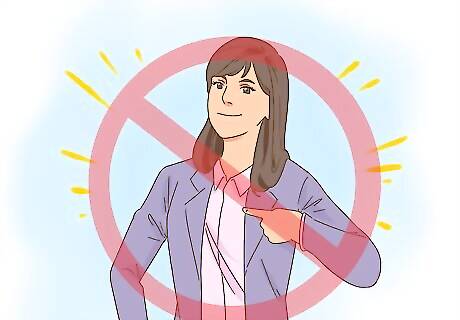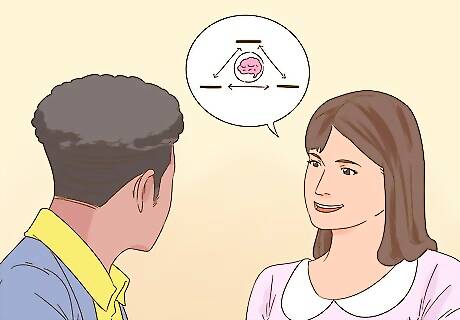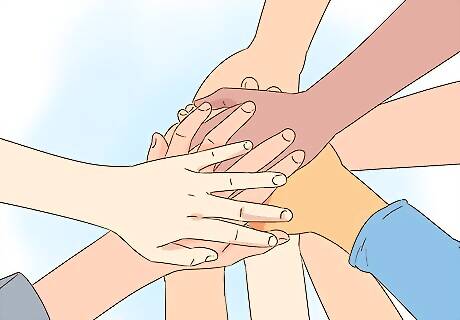
views
Accepting That You Need Help

Don’t ignore feelings of depression or discontent, or self-destructive behaviors. You'll probably never say to yourself, “I think I have Narcissistic Personality Disorder—I should get help for that.” Rather, if you do choose to seek help, it’s likely because you're concerned about impacts you don’t see as connected to narcissism—things like feeling anxious or depressed, an inability to sustain relationships, or self-destructive behaviors. If you feel that something’s missing or isn’t quite right with your life, talk to your doctor and, if recommended, get a referral to a mental health specialist. Narcissists find it extremely difficult to admit that anything is “wrong” with them, so this is definitely a difficult first step to take.

Take an honest look at how other people perceive you. You probably tend to see the criticism (constructive or otherwise) of others as evidence of their shortcomings, and don’t want to admit any of the criticism could be valid. However, try very hard to look at things from others’ perspectives and see how your behaviors may contribute to their views. If people often tell you that you’re self-absorbed, have a sense of entitlement or an inflated ego, or that you lack empathy, fight your impulse to discard these views as jealousy or ignorance. If you can admit to yourself that there may be even a little bit of validity to these views, you may be able to summon the strength to seek treatment.

Ask yourself if you’re willing to challenge your sense of self. Accepting that you’re a narcissist is very difficult, and treating it may be even more challenging. After all, you have to be willing to let go of fundamental aspects of your self-perception and replace them with a more balanced sense of self that can accept shortcomings and imperfections. Some experts question whether it's truly even possible to effectively treat NPD. At the very least, it’s clear that treatment requires a full commitment on both the patient’s and the therapist’s parts. There’s no magic pill (or any type of medication) that can “cure” narcissism, nor any other type of quick fix. You’ll probably have to embrace regular, ongoing therapy with a trained mental health professional.

Seek the support of loved ones. You may have a history of pushing loved ones away due to your tendencies toward self-absorption and lack of empathy. However, in order to get the help you need and stick with it, you’ll require the support of as many caring people as possible. Though it will be a very difficult admission to make, tell them that you know there’s a problem and you are trying to get help. If they offer to help you—by finding potential therapists, driving you to appointments, or providing moral support—fight your urge to reject them out-of-hand.
Getting a Professional Diagnosis

Visit your doctor for an exam and possible referral. Make an appointment with your primary care physician and give a general explanation of your concern—something like, “I’ve been feeling depressed a lot lately,” or, “I don’t understand why I can’t sustain friendships or romantic relationships.” The doctor will likely start by giving you a physical exam, to check for any physical issues that might be affecting your emotional health. They’ll also probably ask you more about the symptoms you’re dealing with, and try to get a clearer overall picture of your mental health. They may also ask about your childhood and your parents, as well as any family history of diagnosed mental health issues, as these may contribute to NPD. If they suspect NPD or another mental health issue, they’ll probably refer you to an expert in that field.

Undergo a psychological evaluation by a trained expert. It’s hard enough, as someone with narcissistic traits, to go to a “regular” doctor and admit there might be a problem. It's even more difficult to admit the same to a specialist. Fight your urge to say that everyone is wrong about you and incompetent, and go to the appointment. The expert will start by asking for more details about your symptoms, upbringing, and so forth, and may give you a verbal or written questionnaire to complete. In the U.S. at least, NPD is generally diagnosed based on the criteria laid out in the DSM (basically the diagnostic handbook for mental health professionals). NPD is less a single disorder than a continuum of disorders determined by the patient’s relation to the criteria.

Accept your diagnosis and focus on your goal with an open mind. It will likely go against every fiber or your being to admit that you have a “disorder” that some so-called “expert” can correctly diagnose. Keep reminding yourself that a diagnosis is not a personal attack on you or a judgment of your character. Rather, the diagnosis is simply a way to identify a key component of your personality and look for strategies that can adjust it to the betterment of your overall health. Focus on the reasons why you sought a diagnosis and the goals you have for treatment. If you want to have deeper and more fulfilling relationships with others, keep telling yourself that the goal is worth the effort you need to make.

Get treatment for related or additional mental health issues. Treatment for NPD itself is focused exclusively on psychotherapy (also called “talk therapy”)—that is, regular meetings with a mental health professional. However, if you have related or additional mental health concerns—things like depression or anxiety, for instance—you may also be prescribed medications or other treatments as well. If you are prescribed antidepressants or anti-anxiety medications, take them as instructed. But don’t think that taking your meds is a substitute for the psychotherapy you need in order to address NPD.
Taking Part in Psychotherapy

Talk about your background and relationship experiences. During your initial sessions, your therapist will try to get to know you and build a rapport with you. Don’t get defensive or be evasive when they ask you about your life, your past, or your struggles. If you truly want to make a change in your life, you must be open, honest, and engaged in the process. While it depends on their individual approach, there’s a good chance that the therapist will try to build an empathetic bond with you so that they can better see things the way you do. This doesn’t mean they’re trying to justify or approve of your behaviors, but rather that they’re trying to build their treatment strategies from your perspective.

Work with the therapist to identify your defenses and triggers. You most likely have a range of defense mechanisms that you employ to block anything that challenges or contradicts your self-perception. In order to build an individualized treatment plan, your therapist must identify these defenses with you so you can both find ways to work around them. Defense mechanisms, for instance, can include mocking or belittling others, or figuratively or literally withdrawing from a situation when you’re challenged. You’ll also need to work together to identify the specific triggers for your defenses. Casting any doubt on your talents at work or your romantic prowess might be triggers, for example.

Develop a recovery plan that emphasizes limits and changes. Some therapists view NPD treatment as similar in ways to addiction recovery treatment. That is to say, the patient needs to develop strategies for avoiding, working around, and denying (when necessary) the triggers that send them down a destructive path. Like others in recovery, you must be willing to admit you have a problem and be dedicated to making positive changes. Based on your unique case, you might, for example, be advised to avoid highly-competitive circumstances at work, or to moderate your expectations when you begin a relationship.

Engage in CBT to identify and replace problematic beliefs and behaviors. Your therapist might employ cognitive behavioral therapy (CBT) in order to help you formulate new strategies for your problematic behaviors. You might, for instance, visualize or talk through various scenarios and work on new ways of approaching how you respond to them. CBT may, for instance, help you to become more empathetic towards others. Not all NPD experts utilize CBT, and it may not be ideal for your unique situation. It’s important that you work with your therapist to develop and stick to the plan that works best for your circumstances.

Embrace group or family therapy if your therapist recommends it. You might benefit greatly from family therapy, since this allows you to work directly with loved ones in identifying triggers and defenses and developing alternative strategies. You may be tempted to feel initially that everyone is “piling on” in criticizing you, but keep your goals and mind and remember that everyone is there to help you. Additionally, your therapist might recommend group therapy, in which case you’ll be given the opportunity to interact with others diagnosed with NPD. It may be helpful to know that you’re not alone in your struggle.



















Comments
0 comment